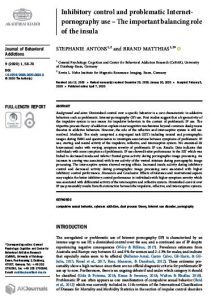Mental Health
Inhibitory control and problematic Internet-pornography use – The important balancing role of the insula.
 Full Article Title: Inhibitory Control and Problematic Internet-Pornography Use – The Important Balancing Role of the Insula
Full Article Title: Inhibitory Control and Problematic Internet-Pornography Use – The Important Balancing Role of the Insula
Open Access: Yes
Abstract
Background and aims: Diminished control over a specific behavior is a core characteristic in addictive behaviors such as problematic Internet-pornography (IP) use. First studies suggest that a hyperactivity of the impulsive system is one reason for impulsive behaviors in the context of problematic IP use. The tripartite-process theory of addiction explains neurocognitive mechanisms beyond common dual-process theories in addictive behaviors. However, the role of the reflective and interoceptive system is still unresolved.
Methods: The study comprised a stop-signal task (SST) including neutral and pornographic images during fMRI and questionnaires to investigate associations between symptoms of problematic IP use, craving, and neural activity of the impulsive, reflective, and interoceptive system. We examined 28 heterosexual males with varying symptom severity of problematic IP use.
Results: Data indicates that individuals with more symptoms of problematic IP use showed better performance in the SST which was linked to decreased insula and inferior frontal gyrus activity during pornographic image processing. An increase in craving was associated with lower activity of the ventral striatum during pornographic image processing. The interoceptive system showed varying effects. Increased insula activity during inhibitory control and decreased activity during pornographic image processing were associated with higher inhibitory control performance.
Discussion and Conclusion: Effects of tolerance and motivational aspects may explain the better inhibitory control performance in individuals with higher symptom severity which was associated with differential activity of the interoceptive and reflective system. Diminished control over IP use presumably results from the interaction between the impulsive, reflective, and interoceptive systems.
Relevance
“Taken together, the insula as the key structure representing the interoceptive system plays a pivotal role in inhibitory control when pornographic images are present. Data suggest that individuals with higher symptom severity of problematic IP use performed better in the task due to decreased insula activity during image processing and increased activity during inhibitory control processing. This pattern of activity might be based on effects of tolerance, that is, less hyperactivity of the impulsive system causes less controlling resources of the interoceptive and reflective system. Hence, a shift from impulsive to compulsive behaviors as a consequence of developing problematic IP use or a motivational (avoidance-related) aspect might be relevant, so that all resources were focused on the task and away from pornographic images. The study contributes to a better understanding of diminished control over IP use which is presumably not only a result of an imbalance between dual systems but of the interaction between impulsive, reflective, and interoceptive systems.”
Citation
Antons, S., & Matthias, B. (2020). Inhibitory control and problematic Internet-pornography use – The important balancing role of the insula. Journal of Behavioral Addictions, 9(1), 58-70. https://doi.org/10.1556/2006.2020.00010
